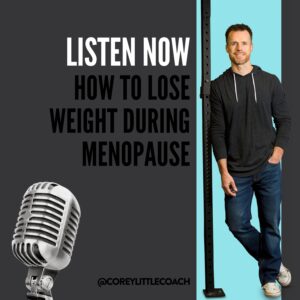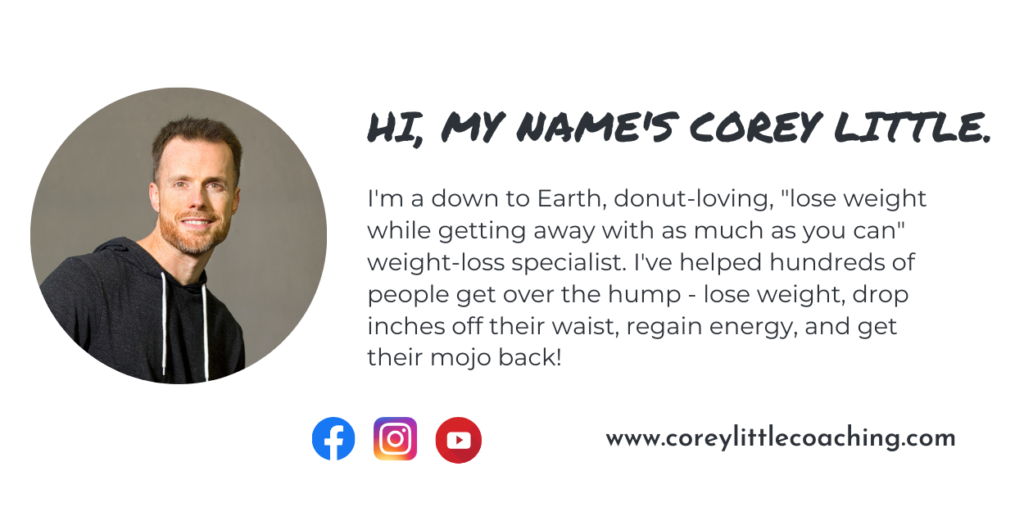
Listen on Spotify | Listen on Apple Podcast
Today’s topic, “How To Lose Weight During Menopause” is one I’ve wanted to explore for a while, and thanks to your fantastic questions and feedback, we’re diving into it today. We’re talking about menopause, a natural phase in a woman’s life that brings with it a myriad of physical and emotional changes. From discussing how to lose weight during menopause to common symptoms, we’ll cover it all.
Navigating Menopause: Understanding the Journey and Weight Management
The Menopause Mystery Unveiled
So, what is menopause, and how might it affect you? Menopause is a phase in a woman’s life marked by significant hormonal changes, particularly a decline in estrogen, progesterone, and androgens (sex hormones). These hormones play a crucial role in maintaining various aspects of your health, from bone density to muscle mass. As these hormone levels start to fluctuate, a range of symptoms can manifest.
Common Symptoms of Menopause
Here are the most common symptoms of menopause:
- More frequent headaches or migraines.
- Joint pain and achiness.
- Tingling sensations or electric shock-like pains in extremities.
- Fatigue and lethargy.
- Hair loss or thinning, along with brittle nails.
- Changes in sex drive (usually a decline).
- Alterations in breast size and comfort.
- Brain fog, difficulty concentrating, and forgetfulness.
- Digestive changes, including potential food intolerances.
- Bloating and changes in appetite and food cravings.
- Systemic water retention, leading to fluctuations on the scale.
- Dizziness and lightheadedness.
- Heart palpitations.
- Jitteriness or tremors inside the body.
- Difficulty losing weight.
- Changes in body composition, potentially resulting in abdominal weight gain.
The Emotional Rollercoaster
It’s not just physical symptoms; menopause can also trigger emotional highs and lows:
- Crying spells and sadness.
- Irritability and anger.
- Panic, anxiety, and a sense of dread.
- Depression and lethargy.
Understanding the Impact
Now that we’ve covered these less-than-pleasant symptoms, it’s essential to recognize that they can vary greatly from woman to woman. Menopause is a highly individual experience influenced by factors such as genetics, ethnicity, lifestyle, reproductive history, cultural influences, and social circumstances.
The Role of Hormones
To understand why these symptoms occur, it’s crucial to grasp the hormonal changes taking place. Your ovaries are akin to a hormonal factory, producing estrogen, progesterone, and androgens. However, as you enter menopause, the production of these hormones gradually decreases. This decline affects your body in various ways, from mood swings to physical discomfort.
The Brain’s Signal
The ovaries receive their marching orders from two hormones originating in your brain: Follicle Stimulating Hormone (FSH) and Luteinizing Hormone (LH). As you journey through menopause, the levels of these hormones also decrease, contributing to the turmoil inside your body.
The Body’s Backup Plan
Your body doesn’t give up without a fight. Even as ovarian hormone production declines, other tissues, such as your adrenal glands and body fat, might start producing hormones. While this might sound like a good thing initially, it can complicate matters, making your hormonal balance even more unpredictable.
The Weight Dilemma
Now, let’s address the million-dollar question: Does menopause make you gain weight? The answer is a tentative “yes.” While menopause itself doesn’t force weight gain, the cascade of physical and emotional symptoms, coupled with hormonal fluctuations, can certainly make it more challenging to lose weight during menopause.
Taking Control
The good news is that you’re not powerless in this situation. You can’t halt menopause, but you can influence how you experience it. Recognizing the difference between stopping and changing menopause is vital. While you can’t prevent it, you can take steps to improve your experience.
Empower Yourself
Don’t let menopause define you or dictate your quality of life. Understand that, with the right strategies, you can manage your symptoms, feel your best , and lose weight during menopause. By focusing on factors within your control, such as lifestyle choices, diet, exercise, stress management, and social connections, you can navigate menopause with grace and resilience.
Take Away
Menopause is a transformative phase in a woman’s life, accompanied by a host of physical and emotional changes. While it may present challenges, it’s essential to remember that you have the power to shape your menopausal journey. By embracing a proactive approach to your health and well-being, you can minimize symptoms, lose weight, and continue to thrive during this life transition. Remember, you’re not alone on this journey, and there is support and guidance available to help you make the most of this remarkable phase in your life.
How You Can Support The Real Life Weight Loss Podcast
If you’ve found value in “Real Life Weight Loss” and want to support it, here are three options:
- Join the Inner Circle Coaching Group – get personalized guidance and a roadmap to success.
- Purchase Rise Nutrition products – try Omega 3, multivitamins, protein powder, or energy powder.
- Drop a tip in the jar – like tipping your barista for great service.
But remember, you don’t owe me anything. This podcast is a labor of love, and I’m grateful for your listenership. Whether you choose to support the podcast or not, I love and appreciate you all the same. Always remember that you are more than just a number on the scale. Losing weight is about gaining life and living the life you’ve always wanted. I believe in you, even when you might doubt yourself.

